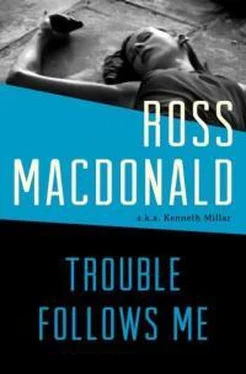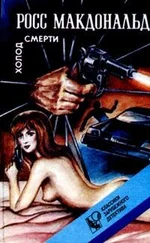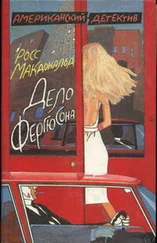“Sure. Joe and I invented plenty of them. I tried to tell the Army Signal Corps about some of them, but they weren’t having any. They seem to think all they’re good for is entertainment.”
I noticed that the small black eyes of the man by the window were watching him. His impassive ophidian stare made me feel vaguely uncomfortable. He was as silent as a snake, and his long heavy-shouldered body had some of a snake’s quiet menace. I was interested in Teddy Trask’s codes and wanted to hear more about them. They struck my mind with a sense of unexplained excitement, like an answer to a question which had troubled me once but had been forgotten. But I decided to wait for a time when we’d have more privacy.
I met Teddy in the smoking compartment a few minutes later, and thanked him for the entertainment.
“Always glad to oblige,” he said with a wide rubbery smile. “Keeps me in practice. By the way, what do you think of that Tessinger girl?”
“She’s as pretty as hell. If I didn’t have other irons in the fire–”
“Yeah, you have, haven’t you? That girl of yours is as slick a blonde as I’ve seen for a long time. You’ve got your hands full, but not everybody can have his hands full of that kind of a package.”
“You seem to be doing all right with Rita.”
“Sure I am. And I like ’em young. I’m getting so I like ’em so young they look as if when you touch ’em they’ll smear. It looks as if I’ll have to break down the old lady first, though. But that shouldn’t be so hard.”
“Have you got a system for that, too?”
“Watch me,” Teddy said. “Just watch me.”
UNDER the influence of the pleasant tedium of motion, the fading effect of whiskey, the soft advance of night, I felt comfortable and sleepy and a little sad. While I sat holding hands with Mary, the train became a luminous worm boring through a continent of darkness. Our lighted car was a center of life and brightness moving in a mysterious shadow pinpointed by the infrequent lights of lonely farms and lost static towns.
She yawned charmingly, curled in her chair like a kitten, and brushed my shoulder with her cheek. “A penny for your thoughts,” she whispered.
“I was thinking about Teddy Trask’s code.”
“Damn you, I thought maybe you were thinking about me. Give me back my penny. I might as well be holding hands with a mechanical thinking machine.”
“You put your penny in the slot, and that’s what came out. I’m not responsible for the workings of my fine well-oiled brain.”
“Well-oiled is the word. Well-oiled with whiskey. And what was the thinking-machine thinking about Teddy Trask’s code?”
“I was thinking that a code like that might possibly be used by an enemy agent. Remember the argument I had with Eric that day in Honolulu? All the codes and ciphers I knew about involve the use of letters, numbers or words. But a code like that of Trask’s could be used without any of them. A monitor wouldn’t even know he was listening in on a code.”
“I don’t get it. But you go right ahead and think about your codes, and I’ll think about all the interesting men I’ve met in my life.”
“Have I been neglecting you?” I squeezed her hand.
“You’re not now. Maybe I won’t think about all those interesting men. As a matter of fact they weren’t so very interesting.”
At dinner we sat with an army officer named Wright who had boarded the train at Fort Madison. He was a short rotund man about forty, wearing the oakleaf of a major and the insignia of the Army Medical Corps. His interest in Mary was too obvious and self-assured to please me. His special field was the psychiatry of battle exhaustion, and he gave us a lecture on it with the air of a peacock spreading his tail-feathers.
In the diner I noticed that Teddy Trask had contrived to share a table with the Tessingers, and that Mrs. Tessinger was beginning to regard him with some favor. Anderson and Miss Green, at a table by themselves, seemed to have found a great deal to talk about.
Shortly after eight o’clock we reached Kansas City, where our Pullman was to be added to the train. There was a half-hour wait, and Mary and I, along with most of the other occupants of the club car, left the train for a breath of air and a walk on the station platform. When our time was nearly up, an army private carrying a large canvas bag came up to me and said:
“Can you tell me where Car 173 is, mate?”
“Isn’t that our car?” Mary said. “It’ll probably be down at the far end.”
The three of us walked down the platform and found Car 173, which was the last car on the train. I left Mary in our compartment and went back to the club car to fetch our bags. When I got back to the Pullman most of our friends from the club car were there: Major Wright, Anderson and Miss Green, the Tessingers with Teddy Trask hovering helpfully about them. The old lady from Grand Rapids had one of the two drawing rooms to herself, and I noticed some time later that the dark man with the sulky face had the other.
The soldier who had asked me his way was sitting in our compartment with Mary while his berth was being made up. He was a young-old man somewhere between 25 and 35, with a lean tanned face and a long lanky body. He said his name was Hatcher. He wore the European Theatre ribbon with three battle stars, and the bottoms of his khaki trousers were tucked into high field boots. I noticed when I sat down beside him that he was a little drunk. I myself was feeling no pain.
As the train began to move he said in a soft voice that had probably originated as a Missouri drawl: “Well, I wonder when I’ll get to see K.C. again.”
“Home on leave?” I said.
“Brother, you said it. And what a leave. Wowy. I’ve seen London and Paris and Shanghai, but K.C. is the town for me. I spent seven hundred and forty dollars in two weeks, and it was worth every cent of it.”
“You didn’t see Shanghai in this war.”
“This war has been going on longer than some people think. I was in Shanghai in ’37. I was a seaman on a British freighter. After that I had a berth on a British passenger ship in the Yangtze fleet.”
“You should be in the Navy.”
“I tried to get into the Navy, but I couldn’t pass the physical. I was in good enough physical shape to move in on Sicily and walk across Normandy, but not good enough to get into the Navy. What do you know about that?”
“I’ve always said the infantry had it tougher than anybody else. The Navy has a pretty quiet time, unless your ship gets hit and you have to swim for it.”
“This is the most unusual Army-Navy debate I’ve ever heard,” Mary said with a smile.
“Well, it’s the truth,” I said with somewhat alcoholic emphasis. “I know damn well the chief reason I applied for a commission in the Navy was so I wouldn’t be drafted as a private in the Army.”
“Say, brother, I like your attitude,” Private Hatcher said. “You’re open-minded, even if you are an officer. How about a drink on it?”
He started to get up but I stopped him. “I’ve got a bottle right here. Half a bottle anyway.”
We each had a drink but Mary turned it down because we had no mixer.
“You say you spent some time in China in the thirties,” I said. “Did you see anything of the Chinese war?”
“I saw the rape of Nanking. It’s something I won’t forget.” His gaze turned inward, and his face lost its cheerful expression. Mary looked at him with interest, but said nothing.
With something compulsive in his voice, something reminiscent of the Ancient Mariner, Hatcher went on: “The ship I was on was hauling passengers out of Nanking up the river to Hankow. Most of them were European, British and French and Russian and some Americans, getting out of Nanking while the getting was good. This was in the winter of 1937. We loaded up the ship for the last run – we didn’t know it was going to be the last run but it was – but we couldn’t get any food for the passengers. We lay off Nanking fully loaded with passengers for a day and a night, while the first mate beat out his brains trying to get something for them to eat. There was food in Nanking all right, see, but the Japs had moved in on it.
Читать дальше







